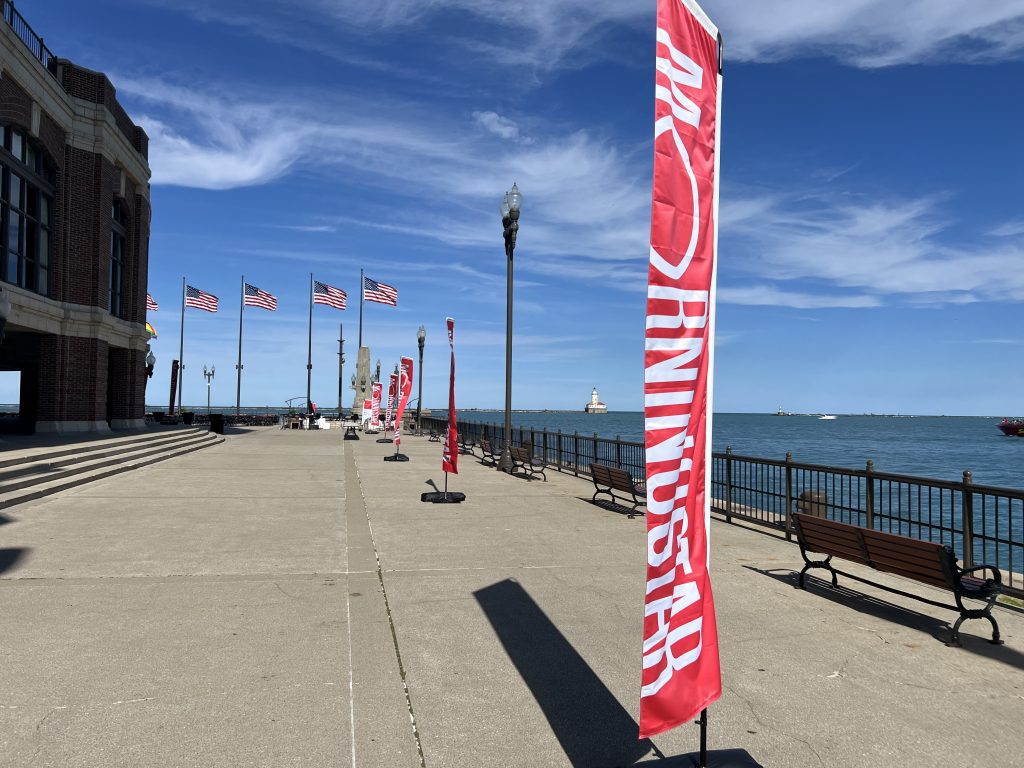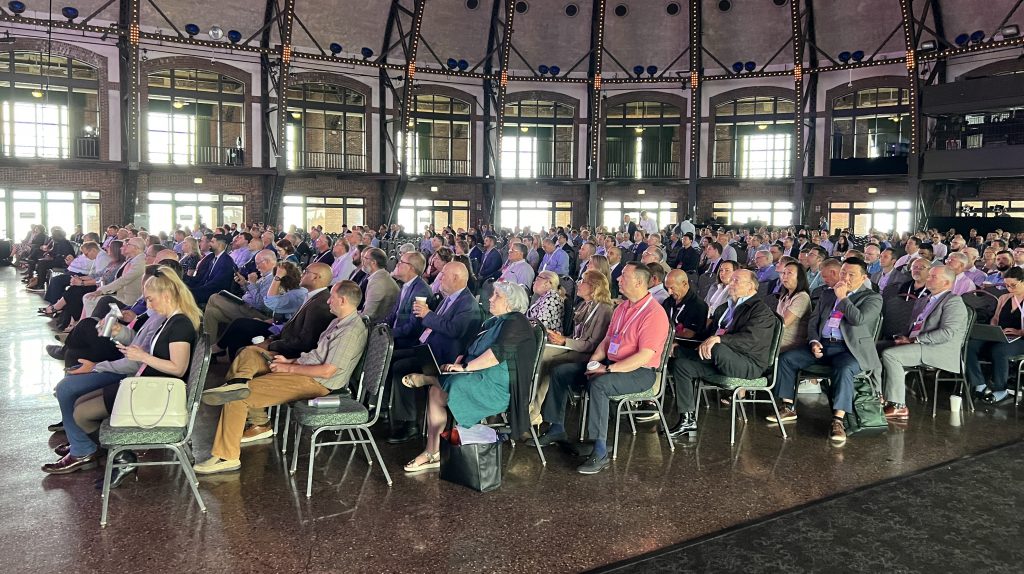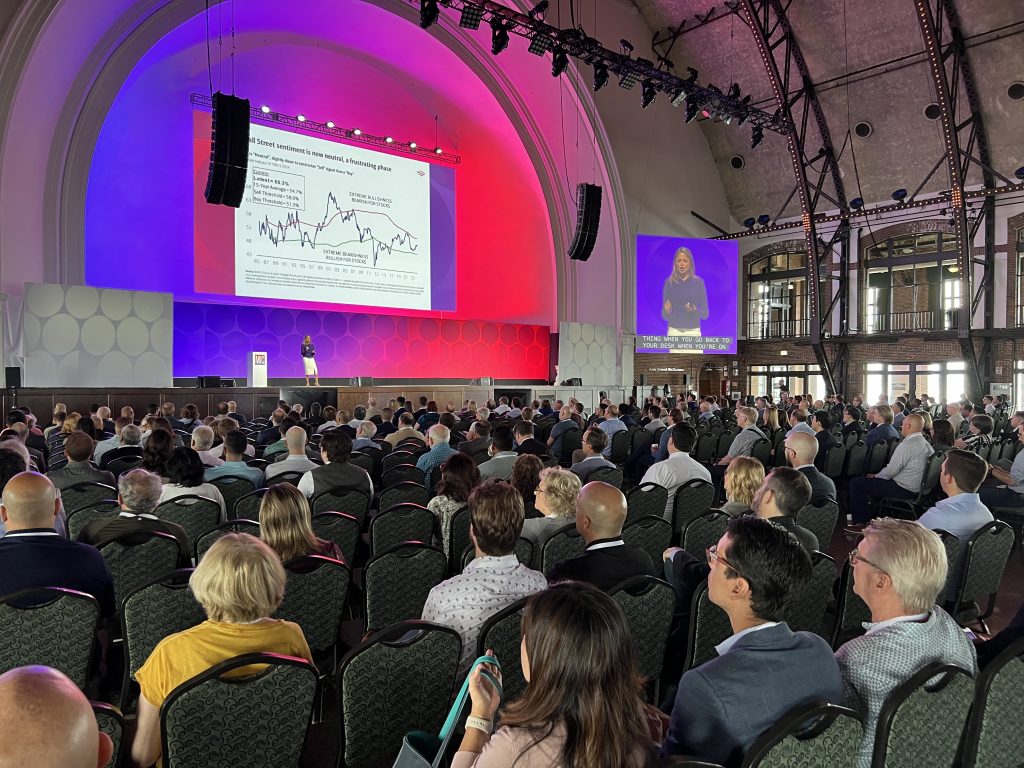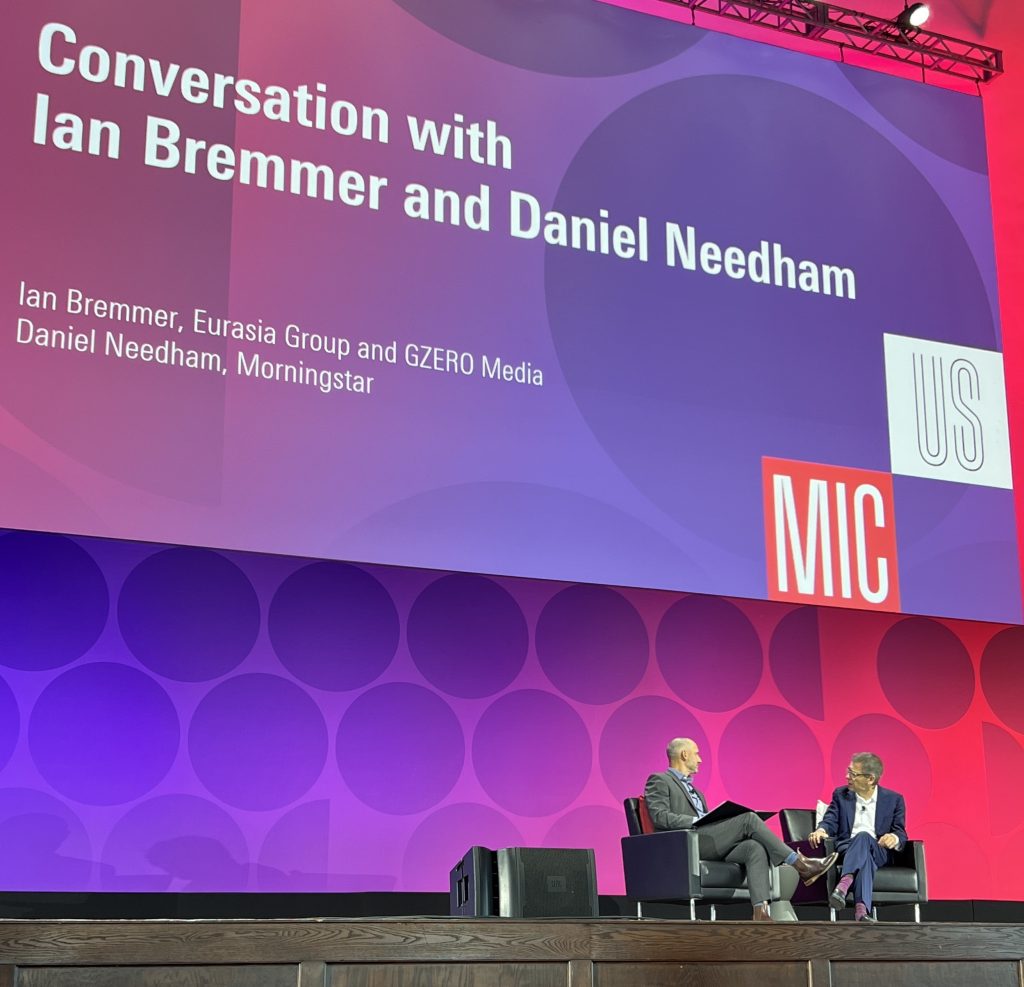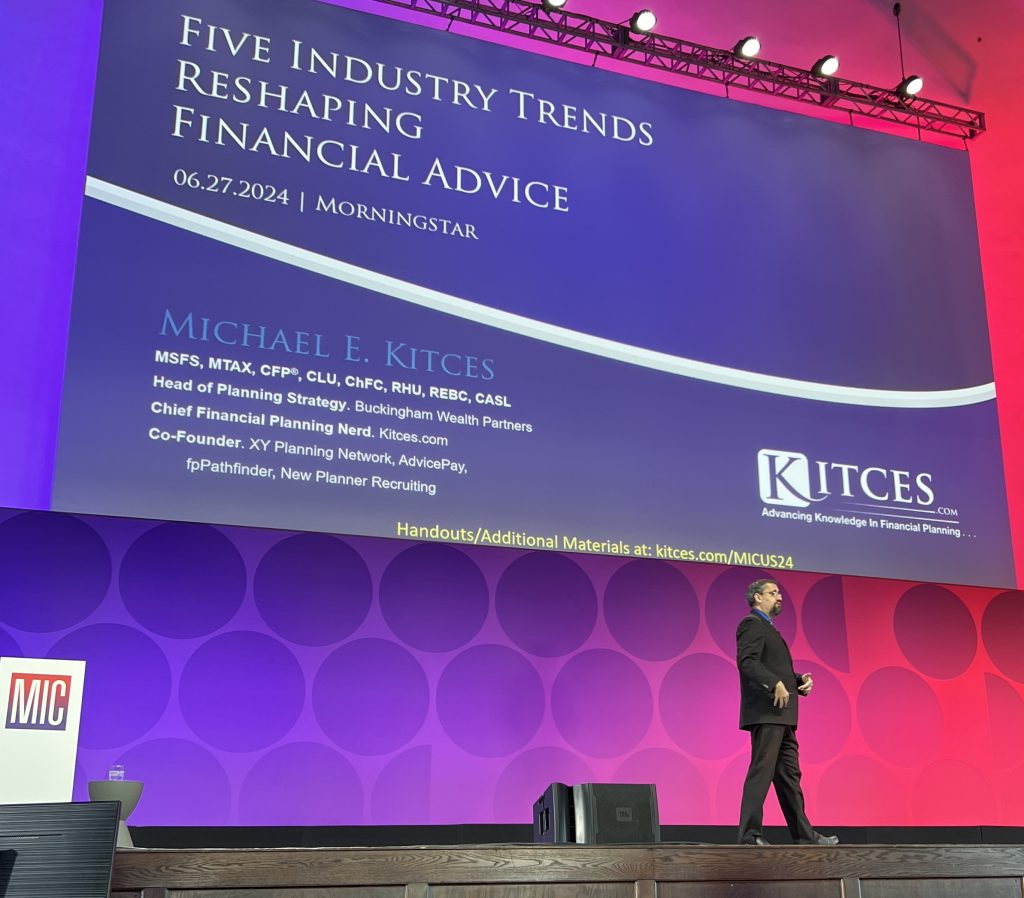Morningstar held its annual investment conference [Morningstar Investment Conference US (MICUS) 2024] last week in Chicago, on 26 and 27 June. It employed a new venue and conference schedule: The Navy Pier and a chock-full, two-day agenda. The 292-foot-wide Pier, which opened originally in 1916, and was “built by the city for the people, is the largest in the world, projecting east 3,040 feet into Lake Michigan. It remains the longest public pier in the world today.”
The occasion also marked Morningstar’s 40th year anniversary, having been launched in 1984 by founder Joe Mansueto, a then young analyst at Harris Associates, out of his Chicago apartment with a $70,000 start-up investment. The name Morningstar derives from the last sentence in Thoreau’s Walden: “The sun is but a morning star.” But one of Morningstar’s senior analysts shared with David Snowball and I that Mansueto’s original name for the new firm was … “Mutual Fund Sourcebook.”
To put 1984 in context: 1976—John Bogle introduces the no-load Vanguard 500 Index Fund. 1977—Steve Jobs introduces Apple II. 1978—first implementation of 401(k) plan. 1979—Charles Schwab computerizes stock transactions. 1980—SEC establishes 12b-1 Rule, and Reagan is elected. 1981—40-year bond bull market begins. 1982—SEC establishes 10b-18 Rule allowing buy-backs. 1983—Internet is established, and Bill Gates launches Windows. 1984—Morningstar rises. 1987—Black Monday, a scary but momentary blip in what was to be a 20-year equity bull run. 1989—Savings & Loan Crisis. 1992—Clinton elected. 1993—State Street debuts the first US exchange traded fund (ETF) SPY.
At a press reception Wednesday night, CEO Kunal Kapoor reflected on the changes in the industry with Morningstar senior analysts and the press, including Don Phillips and WSJ’s Intelligent Investor columnist, Jason Zweig:
- Back then, funds were sold not bought, with emphasis on commissions and loads. Today, with no commissions and loads a rarity, the preponderance of funds are “definitely bought,” not sold.
- The panel expressed an almost nostalgic desire for more in-depth articles with less click-bait titles, but also the recognition that this desire is at odds with today’s media business model.
- Earning trust remains a constant, whether it be a financial advisor or a reporter. It involves three tenents: the person you entrust should 1) have your best interest at heart, 2) is competent and prepared, and 3) will suffer a consequence if wrong, like you will. Only this last point generated a bit of skepticism.
Some general observations and impressions, with the caveat that I could not attend all sessions, but I attended numerous:
- No mention of Bitcoin, cryptocurrency, or blockchain. Zero. Except in a wonderful 3-member panel session on the greatest 21st century US financial frauds.
- No mention of COVID or vaccines. (Such a relief!)
- No mention of Direct Indexing.
- No mention of ESG, well very sparsely.
- A few mentions of Active ETFs, but just glancing reference to Cathy Wood and ARKK, in hushed tones and whispers.
- A zillion mentions of AI and an almost equally “Model Portfolios” usually in same sentence. Mo too returned, after being introduced last year, but a bit more subdued.
- “The Magnificent Seven” mentioned a lot, as was private equity.
- For the first time since 2017, when Kunal became CEO, he did not lead with Morningstar’s Fair Market Value chart at the welcome keynote. (It shows US Market being 2.5% overvalued.) But during an outstanding interview/podcast for Barron’s Advisor The Way Forward, he did insist that it’s been a good predictor, ex ante. (I would agree.)
- Several sessions doubled as podcasts or video recordings for Morningstar (e.g., Christine Benz’s The Long View) and others, which I found both entertaining and efficient.
- Morningstar, like it always does, went out of its way to make this conference informative and current with lots of staff and volunteers to help direct attendees and answer questions. For two full days, all hands on deck. Diverse topics and demonstrations, excellent guest speakers, all of whom must be invited … no one can pay to be a speaker. That said, this was the first year that financial advisors could attend for “free,” if they agreed to listen to some fund company sales pitches. Attendance seemed larger than last year’s 2200, and I found the audience to be diverse … younger, older, female, male. (Although David says most attendees had grey hair, like us, but I disagree.)
- The conference target audience remains advisors. And more and more, the message to advisors is focus on client relationships and let us (our tools and platforms) take care of the rest … portfolio construction, rebalancing, tax management, estate planning, etc.
- One too many mentions of … “Let’s make some FOMO.”
Equity Outlook
Savita Subramanian, Head of Equity Strategy, at BofA kicked off the conference. She professes that we are beginning a “goldilocks” period for equities because of the industry efficiencies, strong balance sheets (lack of leverage), and the need for retirement income for the boomers. This last point will help broaden the recent market rally beyond the “Magnificent Seven” to the other 493, because of equity income.
She sees bottom-line benefits from increased automation and AI over people: “People are risky!” IP as capital instead of traditional infrastructure. She even sees the end of the “anomalous” zero interest rates (ZIRP) as healthy: “Now CEOs and CFOs will need to hustle.” She sees public companies as better investments than private because of illiquidity and lack of transparency in the latter. Our public companies are the most scrutinized in the world and boards are getting better at incentivizing.
Her one emphatic take-away: invest in large cap value, especially if it comes with dividend yield. Fewer opportunities exist in small caps because venture markets delay IPOs. She also sees little risk in the US government doing anything detrimental to big tech: “Nobody wants to help us lose the tech war.”
David posted his perspective of her talk on the MFO Discussion Board. And here is link to Morningstar’s report.
Conversation with Ian Bremmer
Daniel Needham, President Morningstar Wealth, gave another excellent interview, like last year’s with Larry Summers. This year it was with Ian Bremmer, Founder of Eurasia Group and renowned geopolitical strategist. The conversation focused on dealing with uncertainty in current geopolitical environment. Bremmer was breath-taking: We no longer have global stability … we no longer talk of globalization, like 1990’s … we question whether democracy will be a leading political system … and, the threat to democracy in the US is real.
He believes that the “US is the most dysfunctional major democracy” and democracy’s incumbency is being challenged by disinformation, inflation, and immigration, while people rail against the “elites” in the establishment. “The trend is unsustainable.” On the upcoming US election, “whoever wins, the other side will have a trouble accepting legitimacy.” While he does not believe Trump is fit for office, because he “does not care about values” and intends to undermine rule of law, targeting the DOJ, the IRS, and the FBI, Bremmer sees the potential for “bigger tail-risk, both up and down,” largely because he is so transactional. Trump is beholding to men with money, which explains why he flip-flops, like with TicTok. So, bottom-line regarding the election, he asks: “Do you feel lucky?” The Biden administration does care about values and multilateralism and so far, has done a good job containing conflict in Europe (Ukraine) and Asia (Taiwan).
Money has changed representation. “CEOs don’t come to Washington wanting fairer representation.” Just look at former President Trump, Senator Menendez, and Judge Thomas. “Every American has reason to believe democracy is in crisis.” But he ultimately does not think the US will succumb to civil war or a dictatorship.
The US is the most individualistic of all countries, which provides fertile ground for the algorithms coming out of Silicon Valley. “They are not interested in social norms.” Healthy societies need ties that bind: churches, classes, family, civic events. Without them, everybody that feels on the periphery will get spooled-up through social media. Ultimately, a crisis is needed to address the root cause of our divisions.
Internationally, he sees UK returning to EU. Germany and Netherlands and most of Europe as center right and mostly stable. But if the far right takes over France, we will see a France like no other. “Macron made a huge mistake in calling for the snap election.” Bremmer does not lump China in with Russia, Iran, North Korea. The latter are chaos actors that want the US to fail. “China wants stability, but with a different world order.” Bremmer believes China will lead the world in energy transition, while the US leads in AI. The rest of the world will need to be integrated with both. And that may be the silver lining.
Here is link to Morningstar’s report.
Five Trends Reshaping Financial Advice
Michael Kitces of Kitces.com gave a fascinating talk examining how disruptive technology has changed the world. Despite many predictions of obsolescence for the financial advisor, the industry has adapted and even prospered.
Kitces coins the five trends: Technology, The Great Convergence, Crisis of Differentiation, The Search for New Models, The Client Experience.
His talk ranged from The Luddite Revolution to The Industrial Revolution to May Day 1975, when the SEC decommissioned brokerage and stock transaction fees paving way for discount brokers, like Charles Schwab, to the “no-load mutual fund supermarket” to turn-key asset manager platforms (TAMPS) to rebalancing software to RoboModels and RoboAdvisors to the “model marketplace.”
Each generation this past century has experienced disruptive technologies. The computer in 1970’s, internet in 1990’s, AI in 2010’s. The technology broke down traditional barriers in the investment industry. And now, it’s becoming harder to distinguish your services and attract new clients. What’s worse? “Clients don’t believe you.” Boomers represent the dominant target client base with assets outside already defined retirement plans. We are all focused on retirees because “no one else has AUM (assets under management).”
He groups investors into delegators, which love the AUM model, and validators, which hate the AUM model. The former hand-over management of their savings to the advisor, while the latter just look to them to validate their investment ideas.
He recommends that advisors ask themselves what they are best at and then craft their interactions with their clients accordingly. When an advisor makes “doing business” a positive experience for the client, it becomes easier to differentiate. 
Chicago
In the aftermath of COVID, riots on Michigan Avenue following George Floyd’s killing, the exodus of Ken Griffin’s Citadel and Guggenheim Partners, and a new mayor elected in 2023, the city appeared bustling and vibrant on these last days of June. Crime is down from its 2021 highs. “Best summer city in America,” I heard more than once. Morningstar’s headquarters remains in Chicago, its chairman a big champion, and many of its staff seem very happy with life in the city and surrounding communities.
On Thursday evening, after the last session, I walked to the Art Institute of Chicago, where I enjoyed its permanent Impressionist Collection and a new Georgia O’Keeffe exhibit. Afterward, I strolled through the gardens around Millennial Park, where Chicagoans were enjoying an outdoor concert open to all. Despite its challenges, on this evening all seemed right with the world.
This year marks my 12th in attendance. I regard the event as an annual touchstone for staying on-top of trends in our industry, getting access to investment and global thought leaders, while feeling the pulse of big city life in America.









